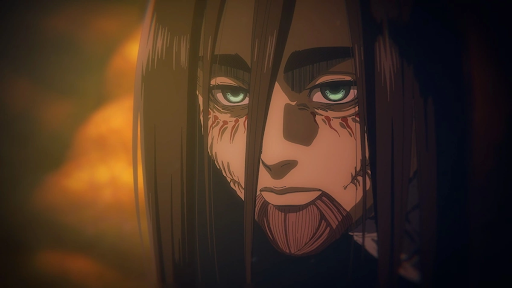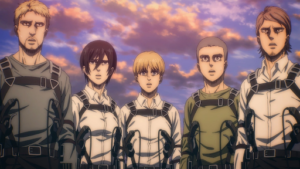Ten Years of Eren Yeager: An Attack on Titan Series Finale Review
Spoilers Ahead.

Rebecca Horton ‘25 / Emertainment Monthly Assistant TV/Misc Editor
Attack on Titan has all the makings of a phenomenal anime. It has a compelling hook, a plethora of brilliant characters and stunning animation from beginning to end. Beyond that, it has a consistently dedicated fanbase who have followed the show since it aired over a decade ago. There is no doubt that it is one of the most beloved anime of all time. That being said, the premiere of the long awaited series finale begs the question: did Attack on Titan stick the landing?
Based on the manga series written and illustrated by Hajime Isayama, Attack on Titan is about a young boy named Eren Yeager (voiced by Yuki Kaji in Japanese and Bryce Papenbrook in English). Eren lives within a walled city, designed to protect humanity from giant-esque, man-eating humanoid creatures called “titans.” After titans destroy his home and slaughter his mother, Eren—alongside his friends Armin Arlert (voiced by Marina Inoue in Japanese and Jessie James Grelle in English) and Mikasa Ackerman (voiced by Yui Ishikawa in Japanese and Trina Nishimura in English)—joins the Survey Corps, a military branch tasked with killing titans, to seek revenge. During his time with the Survey Corps, Eren discovers his own titan-related powers, reveals the true nature of the titan’s origins, and suffers the consequences that come with knowing that truth.
Attack on Titan knows what it does well, and it will never fail to deliver. The show is responsible for some of the best fight scenes in anime, effortlessly combining fluid animation with fast-paced, action-packed combat. The finale was held to a high standard, established by the brilliance of the seasons which came before it. Opening with an hour long fight scene which serves as a culmination of the series to date, it easily surpassed all expectations.
What makes the final battle so powerful is that it makes use of each and every character—both living and dead—that the audience has known and loved for ten long years. Attack on Titan has received well-deserved praise for its characters: Isayama does a commendable job of writing them with the emotional complexity of real people. This level of complexity is necessary for the ever-expanding scale on which Attack on Titan operates. These characters are faced with unprecedented stakes—in no other show could you expect to see 80% of the world’s population mercilessly wiped out—and they must respond accordingly.

That being said, Attack on Titan is not without its well-deserved criticisms. At times, the show is heavy-handed to the point of obfuscating its own message. At its core, Attack on Titan is a critique of the cycle of violence that, at times, seems innate to humanity. The show borrows from real life conflict in order to ground the fantasy in a sense of realism. This is a common practice, both in anime and in other forms of media; however it is a notable point of contention when it comes to Attack on Titan. The show incorporates a significant amount of World War II imagery into its storytelling, and even attempts to draw a parallel between “Marleyans,” and “Eldians,”—Attack on Titan’s two warring parties—and Nazis and Jews. For example, Eldians living in the nation of Marley are confined to ghettos and made to wear armbands identifying their race. While this comparison is supposed to communicate the sheer horror of the war, it is extremely misguided in that Eldians are not an appropriate equivalent to Jewish people. In fact, the attempt to make this comparison results in the perpetuation of harmful antisemitic stereotypes, which are antithetical to the message of the anime itself.
Despite what numerous fans have claimed, Attack on Titan is a good anime, not a perfect one. The show is hindered by a number of flaws which should not be overlooked. While it is not perfect, it is certainly revered. The finale, over a decade in the making, cemented its legacy as an undeniable commercial success. Despite its weaknesses, Attack on Titan will surely go on to be remembered as one of the most beloved anime of the 2010s.